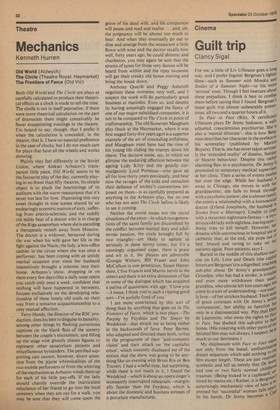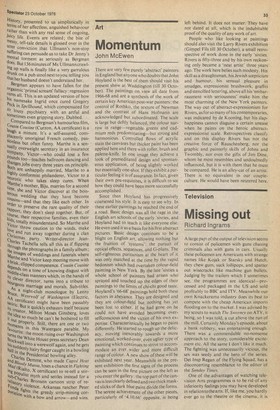Cinema
Guilt trip
Clancy Sigal
For me, a little of Liv Ullmann goes a long way, and 1 prefer Ingmar Bergman's lighter films—such as Summer with Monika and Smiles of a Summer Night—to his more 'serious' ones. Though I feel insecure about these prejudices, I think it best to confess them before saying that I found Bergman's latest guilt trip almost unbearably preten. tious, all two and a quarter hours of it. In Face to Face (Ritz, X certificate) Ullmann plays Dr Jenny lsaksson, a well' adjusted, conscientious psychiatrist. She IS also a mental illiterate'—this is how Bell. man describes her character in the preface t° his screenplay (published by Marion Boyars). That is, she has never taken serious. ly the 'extended reality' of dreams, fantasY or bizarre behaviour. Despite this rather alarming flaw in a psychiatrist, Dr JennY is promoted to temporary medical supervisor at her clinic. Then a series of events gushes. her over the edge. While her husband IS away in Chicago, she moves in with her grandparents; she fails to break through with a psychotic patient: she is almost raged; she enters a relationship with a homosexual doctor ( Erland Josephson, the husband in Scenes from a Marriage). Unable to core with a recurrent nightmare-fantasy—a mYs' terious old lady with sightless, staring eyes-Jenny tries to kill herself. However, her dreams while unconscious in hospital are sr; cathartic that, at the end, she pops out °I bed, braced and raring to take on her patients again. Poor patients, says I. ri Buried in the middle of this shallow exe cise on Life, Love and Death (the car° letters are Bergman's) is a dignified, touchillg sub-plot about Dr Jenny's grandparent,s'. Grandpa, who has had a stroke, is irritatT and even more withdrawn than osaa grandma, who almost left him years ago, ha., come to a sort of understanding—not exactIe ly love—of her stricken husband. Their °ale of grace contrasts with Dr Jenny's bri% 'compassion', her ability to function h."0 only in a disconnected way. Pity that de Laurent us, who owns the rights to rare to Face, has slashed this sub-plot to bake bones. (His tinkering with other parts of finished film may not always, I suspect, be? much to our detriment.) My displeasure with Face to Face stenifigs not only from the banal, unilluminat,lhe dream sequences which add nothing t° film except length. These are just routine, ap symbolic and tell us merely that Dr l od had one or two fairly normal childh°_,n, traumas. (Being locked in a cupboard. uri.s loved by mania etc.) Rather, it is Bergrnare. surprisingly mechanistic view of how a pressed but 'successful' woman falls Oa Case In his hands, Dr Jenny becomes a Case In his hands, Dr Jenny becomes a History, presented to us simplistically in terms of her affect less, anguished behaviour rather than with any real sense of ongoing, Juicy life. Events are related; the bite of messy, tell-tale details is glossed over in the utter conviction that Ullmann's non-stop suffering can persuade us to take Dr Jenny's Mental torment as seriously as Bergman does. But 136 minutes of Ms Ullmann crawling 1113 walls is finally like a very garrulous drunk on a pub stool next to you telling you that her husband doesn't understand her.
Bergman appears to have fallen for the orgasmic 'primal scream' fallacy: regression cures all. This is an updated version of how his namesake Ingrid once cured Gregory Peck in Spellbound, which compensated for iIs lousy psychiatry with an artful and sometimes even gripping story. Dubbed. Compared to Bergman's humourless film, C0USIflCousine (Curzon, AA certificate) is a laugh a minute. It's a self-assured, cornPlacently unoriginal French comedy, passionless but often funny. Marthe is a sensually overweight secretary in an insurance company, Victor—who could lose a few Pounds too—teaches ballroom dancing and changes jobs every three years on principle. Both are unhappily married, Marthe to a highly conformist philanderer. Victor to a neurotic who takes sleep cures. When Marthe's mother, Biju. marries for a second tinle, she and Victor discover at the boisterous wedding that they have become enusins--and that they like each other. In order to preserve the rare quality of their rapport, they don't sleep together. But, of ckpurse, their respective families, even their kids, totally misunderstand. So Marthe and Victor throw caution to the winds, make i„ve and run away together during a clan k-hristmas party. Writer-director JeanCharles Tachella tells all this as if flipping through the photographs in a family album; the images of weddings and funerals where marthe and Victor keep meeting move with a brisk, clipped competence. Cousin Cousine depends on a tone of knowing disgust with
icidle-class manners which, in the hands of
Iis clever director, turns into a tribute to bourgeois marriage and morals. Sub-titles. Bruce a night-club monologue by Lenny Bruce Werewolf of Washington (Electric. s'AaAt. certificate) might have been passably Crelur,t it quickly exhausts itself because itS iric. Milton Moses Ginsberg. loves it c idea so much he can't be bothered to fill rricolut Properly.Still, there are one or two f,„ nlen Is in this Watergate parable. My e: the moon rising over Washington su-Ins the White Nous:: press secretary Dean ,o IS Suddenly ckvvell into a werewolf again, and he gets hairy finger caught in a bowling 4,,11.1n the Presidential bowling alley. an"-drlaarles Demme, who made Caged Heat mar/dY Mama, loses a chance in Fighting in Rialto. X certificate) to re-tell a stir
i g Popui si-lb-charst myth and settles instead for ale
taliat s Bronson cartoon strip of re
p cirY violence. Arkansas rancher Peter
onda DOrat fights the greedy strip-mining corcM With a bow and arrow--and wins.











































 Previous page
Previous page